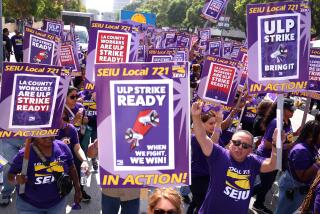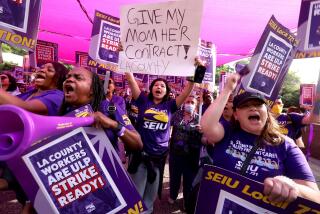MTA Strike Delayed for at Least a Week; Board, Union to Meet
- Share via
A threatened strike by bus and train drivers of the Metropolitan Transportation Authority has been put off for at least a week, MTA officials said Saturday.
The MTA made its announcement after Los Angeles Mayor Richard Riordan and other MTA board members agreed to hold an unusual face-to-face meeting with union leaders.
Goldy Norton, a United Transportation Union spokesman, confirmed the postponement but would not comment further.
The announcement came less than 36 hours before a walkout that had been scheduled for 12:01 a.m. Monday and would have stranded 1.2 million riders.
After an emergency three-hour, closed-door meeting, MTA board members announced that Riordan, county Supervisor Ed Edelman and Glendale Councilman Larry Zarian would meet with union leaders representing 6,400 drivers, mechanics and clerks. No date has been set for the meeting.
Edelman, chairman of the MTA board, said the meeting will not be a negotiating session but an effort to hear union leaders’ concerns about issues on the bargaining table.
“As a result of the board commitment to meet next week, the leadership of the unions told the MTA negotiating team that they will not strike Monday at 12:01 a.m.,” Edelman said.
“I am optimistic, although I cannot be certain we will get the right results,” Riordan said.
MTA Executive Officer Franklin White said: “The meetings involving our board members and the union leaders will not be negotiating sessions. This will, however, give the union leaders an opportunity to express their concerns directly to our board officers. Then we will seek contract solutions at the bargaining table.”
The MTA and its unions are said to be close to an agreement on a pay raise. But they are still arguing over proposed changes in work rules and subcontracting. The MTA has proposed a change in scheduling that would make it more difficult for drivers to claim overtime pay. Union officials denounce the proposals, which they contend could cost members $1,000 a month in lost wages.
Union spokesman Norton said last week that the union had made a “bottom line” proposal to management “which addressed their budgetary problems, providing them with a possibility for saving millions of dollars.” He declined to provide specifics.
MTA officials contend that many full-time bus and train operators earn an average of $50,000 annually with overtime, making them among the highest paid transit operators in the nation. “The general rule is that 25% of the drivers’ annual income is overtime, and overtime is done at management’s request,” Norton said.
Drivers on the job for 42 months earn the top rate of $18.37 an hour, according to the MTA.
If there is a strike, it would be a double whammy for bus and train riders who last week were hit with a fare increase. A strike would be the first shutdown of the nation’s second-largest transit system since 1982, when drivers walked off the job for five days. There was a 68-day walkout in 1974.
Unlike transit workers in some East Coast cities, California bus and train operators are not prohibited from striking.
A strike would not include Metrolink or municipal or private operators such as the Los Angeles city Commuter Express and DASH shuttle buses, the Long Beach, Montebello and Santa Monica municipal lines and Foothill Transit.
More to Read
Sign up for Essential California
The most important California stories and recommendations in your inbox every morning.
You may occasionally receive promotional content from the Los Angeles Times.














